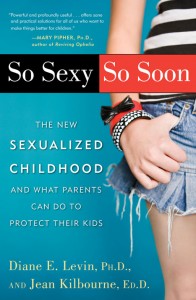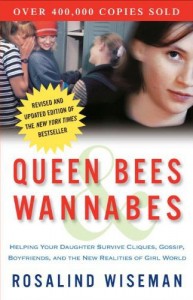|
|
February 1, 2010
 Teen love One Saturday afternoon before I headed out to meet my boyfriend at the high school tennis courts, my mom said, “Let him win.”
Even though it was before Billie Jean King served Bobby Riggs a massive slice of humble pie, I was stunned. Let him win?! Excuse me?!
I might have only been 16, but I knew there was no way in hell I would play the Dating Game by rules that also included:
“Don’t wear your heart on your sleeve.” And… “If a boy asks you out after noon on Wednesday for Saturday night, tell him you’re busy even if you’re not.”
Recently, I asked other parents what Boyfriend Girlfriend Zone wisdom they got from their folks. As you can see, some of the pointers were right-on, others not so much:
About Dating and Sex
- “Play hard to get.”
- “Go out with self-actualized (liberated) girls, but open the door for them anyway!”
- “Always go out with everyone who asks you because you might fall in love with his brother or best friend.”
- “Don’t trust boys who are too nice to a girl’s parents. It’s always an act!”
- “Always be a gentleman. This will automatically put you above most other guys in a girl’s eyes.”
- “A man wants a woman who makes him feel comfortable.”
- “Be yourself. That way the person you’re dating will like you, and not someone you’re pretending to be.”
- “If you wouldn’t want to bring them home to meet your family then they’re not good enough for you to date.”
- “When a girl says no, she means no.”
- “Don’t just be ‘good,’ that’s only a rule. Be wise.”
- “Give references, but no samples.”
- “If you’re going to be stupid (have sex before marriage) be smart (protect yourself!).”
I’m inundated with daily email from teens who are utterly clueless about dating. Some typical questions:
The U.S. and the UK have the highest rates of teen pregnancy amongst western industrialized nations. Nothing to be proud of. And the number of those pregnancies in the US is up after a 10 year decline. Likewise, STD rates amongst teens is skyrocketing, especially HPV (human papillomavirus). One recent study found that 4 out of 5 sexually active teen girls infected with HPV!
Abstinence Only Sex Education programs, which received $1.3 billion in federal funding during the Bush years, owe us all a refund. This isn’t and never has been “education” nor does it prepare kids to make informed choices about their sexual behavior. So they make uninformed choices often and repeatedly.
Before you ground your teens for life, please note that everyone is not doing it. In fact, American teens are now waiting longer to have their first sexual intercourse. By age 15 only 13% of teens have had sex. Sounds encouraging, except that many of those under 15 who aren’t having intercourse are definitely messing around. (I’ll get to that in a minute.) Amongst 15-19 year olds nearly half (46%) have had sexual intercourse at least once. While it’s great that some teens are waiting longer, I’m not thrilled at the idea of 15 and 16 year olds having sex. Many girls are very conflicted about it but they believe it’s necessary to get and keep a boyfriend. (Wonder where they get that idea?)
Another problem is that many 11-14 year olds simply don’t know the definition of sex. Plenty of middle school students consider oral sex to be “like no big deal.” Last week I got an email from a 14-year-old who was “committed to remaining a virgin” but was considering “doing it from the rear” because her boyfriend wanted to “try something new” and she didn’t think that anal sex was… well, you know, actually sex.
Girls must understand unequivocally that saying no is their right. Too many girls don’t feel good about turning a guy down because they don’t want to be “mean.” Guys need to know that sexual contact with a girl is not their right. Healthy relationships are based on 2-way trust, respect, honesty and open-communication. Moms and dads need to bring home these points to their sons and their daughters.
Here are some questions for you to think about (and resolve) before you begin a new kind of conversation with your tweens and teens about dating and sex.
- What’s your personal attitude about teen dating? Teen sex? Is it different for your daughters than it is for your sons?
- If you’re raising kids with someone, are you and your partner on the same page with these attitudes?
- What have you learned about relationships from your time as a teen that you can comfortably share with your child?
- What kind of social/sexual behavior do you expect from your daughter/son?
- Have you made your behavioral expectations crystal clear?
- In what ways are you doing a great job letting your kids know that they can always come to you with questions/concerns (about their body, about sexual feelings, about the pressure to have a boyfriend/girlfriend and to “do stuff”).
- In what ways could you do a better job in the communication/information and listening arena?
There’s more blatant sexuality in the media and in our kids’ lives than there was in ours. With that comes intense pressure to look sexy and to act it out. That’s why our kids need better advice from us than what got from our parents.

January 17, 2010
 “So Sexy So Soon: The New Sexualized Childhood and How Parents Can Protect Their Kids” by Diane E Levin, Ph.D. Little girls have dreamed of being princesses as long as there have been fairy tales. Thanks to Hans Christian Anderson, I myself had a slightly off-kilter fantasy of growing up to be a mermaid. But if I wanted to dress up as a mermaid for Halloween or to paddle around in my friend’s plastic pool I needed to create my own tail, so to speak. Like all former kids who are now today’s parents, my fantasies came directly from my own imagination… evolving naturally from my interests and taking me into realms I chose to explore through play.
But for 21st century kids, kids who live and breathe packaged princesses, Bratz dolls and Transformers, things are very different when it comes to what they play with, how they play and what they wear.
If you’ve got a daughter who can walk and talk you’ve likely had at least a few conversations and some strong disagreements about her choice of clothes. There’s nothing new about any of this. It’s the job of every generation to attempt to scandalize their parents. We did it to our parents and we didn’t turn out so bad.
But pop culture is way more extreme now and something very destructive is being foisted on our kids via TV shows, movies, print and media ads and on the racks in children’s clothing stores. For one thing, styles for girls of all ages are moving in a very dangerous direction. So much of what’s sold is too short, too tight, too low cut, too peek a boo, too… sexy for little girls. Yet there it all is. And they want these styles. Man, do they want them! Because their friends wear them and because too many little girls, tweens and teens truly believe that their value as people is a direct function of how they look.
It gets harder and harder for parents to carry out our prime objectives: keeping our kids safe and raising them to be compassionate, thoughtful, self-assured young adults. But the issue goes way beyond short shorts, crop tops and G-strings marketed for tweens. Beyond TV shows and toys that program girls and boys to think and act and play and dream in the narrowest, most gender-specific ways.
What’s going on here in 21st Century America is a war of values. On one side, parents doing their best to raise healthy young adults. And what are we up against? The marketing might of multi-billion dollar corporations. You probably don’t need anyone to tell you who’s winning.
In this week’s podcast I talk with Diane E. Levin, co-author of So Sexy So Soon: The New Sexualized Childhood And What Parents Can Do to Protect Their Kids.
Dr. Levin is Professor of Education at Wheelock College in Boston. She has written seven other books including: The War Play Dilemma, Teaching Young Children in Violent Times and Remote Control Childhood? Diane Levin speaks around the world on the impact of violence, media and other societal issues on children, families and schools.
Listen to my interview with Diane Levin right here:
[QUICKTIME http://www.anniefox.com/podcast/FC014.m4a 300 300 false true]
If you have iTunes, you can subscribe to this podcast in the iTunes Store.
Or, you can download an MP3 version here.
Upcoming guests include:
Amalia Starr, author of Raising Brandon: Creating a Path to Independence for your Adult “kid” with Autism & Special Needs
Matthew Amster-Burton, author of Hungry Monkey: A Food-Loving Father’s Quest to Raise an Adventurous Eater
David McQueen, international speaker empowering adults and youth alike on subjects such as leadership, careers and communication skills.
Hannah Friedman, author of Everything Sucks: Losing My Mind and Finding Myself in a High School Quest for Cool
Dara Chadwick, author of You’d Be So Pretty If…
*What’s a podcast? “A podcast is a series of digital media files, usually either digital audio or video, that is made available for download via web syndication.” –Wikipedia… So, in this case, there’s an audio file for you to listen to (in addition to reading the above).

December 21, 2009
 Sometimes we choose to walk alone. Sometimes we've got no choice. Right before Thanksgiving a few years back, a dear friend emailed me: “I know this is incredibly presumptuous, and Miss Manners would be scandalized, but I’m wrangling for an invitation.”
I was blown away. Not by her directness (God no!) but by the fact that she felt she had no right to say, “I need a place to be on Thanksgiving. Can you help me?”
We were heading out of town for the holiday, but I immediately called my friend and thanked her for trusting me with the truth and for honoring herself. She was relieved she’d done the right thing by speaking up. Most of us are much quicker to stand up for others than for ourselves. Especially women. On some level we must believe that we don’t deserve to get our emotional needs met. But where does that foolishness come from?
Babies are irresistibly cute so adults fall hard and take care of them. Once they’ve gotten their sweet baby hooks into our hearts, they’re great at expressing their physical and emotional needs. But as our kids grow, our conversations with them center mostly on the physical aspects of life: Sweetheart, are you hungry? Do you want something to drink? Is it nap time? Why don’t you put on a sweater?
As a result, asking for that tangible stuff is very easy for kids: Dad, I need a ride. Mom, I need you to sign this. I want a new computer. I need some money. Because most parents don’t focus on helping kids express emotional needs, tweens and teens rarely say: I need a hug. I need to share this exciting news! I need a shoulder to cry on. I need a kind word. I need a friend. I need you to tell me the truth. I need help.
I asked a bunch of 6th-8th graders to rate themselves on these two statements: “It’s easy for me to ask for help.” and “I pretend things are OK when they aren’t.” The results? 25% of the kids said, “It’s never or almost never easy for me to ask for help.” Another 25% reported that “sometimes” they had trouble asking for help. And here’s another sad finding: A whopping 83% admitted that “sometimes, always or almost always” they pretend things are OK when they really aren’t.
An unwillingness to ask for help coupled with a habit of pretending things are fine when they’re not is no way to live. In fact, when we deny our human need to connect heart-to-heart, we end up short-changing ourselves and the people we’re closest to.
A parent’s role is to raise an emotionally healthy young adult. That includes helping a child recognize what he/she is feeling and learning to ask for support when needed. Of course self-reliance is essential and being able to calm yourself at times of stress is a life-skill, but we’re all interdependent. When we let people love us and help us, we honor the most human part of ourselves.
Turns out my friend was brave enough to express her needs to someone else who gladly opened his heart and home. Consequently she had a wonderful holiday.
This season, hold nothing back. Allow yourself to love and be loved fully, without reservation.
Peace.

December 7, 2009
 "Queen Bees and Wannabes: Helping Your Daughter Survive Cliques, Gossip, Boyfriends, and the New Realities of Girl World" by Rosalind Wiseman Along with the many changes teens experience on the road to adulthood, shifting friendships are some of the most dramatic and painful. It’s especially true for girls. While our daughters muddle through the social muck of middle and high school trying to figure out who’s a friend worth keeping and who is so not, they frequently attack each other in very personal ways.
We can thank technology, in part, for the ease with which today’s girls effectively bash and degrade their fellow students. But technology didn’t teach them that this stuff is OK. Could it be they’ve picked up some life lessons from the snarky remarks they’ve heard us make about other women? “My god! She got so fat!” “Whoah! She looks old!” “What happened to her? Is she wearing a mask?” Wait a minute, you say. Maybe those remarks are less than charitable, but they were aimed at celebrities… fair game. We certainly never trash talk anyone we actually know. Well, at least not to her face. But when our daughter has a “problem” with another girl, she is likely to go straight for the jugular.
No parents want to imagine that their sweet little girl would intentionally hurt anyone (no less a friend) but it happens… a lot! What also happens way too often is that girls who are targeted don’t have the courage to speak up for themselves. Which may explain why this friend-to-friend social aggression might be going on via text, IM and Facebook in your home without your knowing it.
In this week’s podcast I talk with Rosalind Wiseman, author of Queen Bees and Wannabes: Helping Your Daughter Survive Cliques, Gossip, Boyfriends, and the New Realities of Girl World which has just been re-released in a new edition covering the impact of technology on Girl World. Twice a New York Times bestseller, Queen Bees & Wannabes was the basis for the 2004 movie Mean Girls. Rosalind’s follow up book Queen Bee Moms and Kingpin Dads: Dealing with the Difficult Parents in Your Child’s Life was released in 2006.
Rosalind Wiseman is an internationally recognized expert on children, teens, parenting, bullying, social justice, and ethical leadership.
Listen to my interview with Rosalind Wiseman right here:
[QUICKTIME http://www.anniefox.com/podcast/FC013.m4a 300 300 false true]
If you have iTunes, you can subscribe to this podcast in the iTunes Store.
Or, you can download an MP3 version here.
Upcoming guests include:
Diane E. Levin, co-author (with Jean Kilbourne) of So Sexy So Soon: The New Sexualized Childhood And What Parents Can Do to Protect Their Kids
Susan M. Heim, author of It’s Twins! and Chicken Soup for the Soul Twins and More
Hannah Friedman, author of Everything Sucks: Losing My Mind and Finding Myself in a High School Quest for Cool
Dara Chadwick, author of You’d Be So Pretty If…
Matthew Amster-Burton, author of Hungry Monkey: A Food-Loving Father’s Quest to Raise an Adventurous Eater
*What’s a podcast? “A podcast is a series of digital media files, usually either digital audio or video, that is made available for download via web syndication.” –Wikipedia… So, in this case, there’s an audio file for you to listen to (in addition to reading the above).
 — Older Posts »
| |















